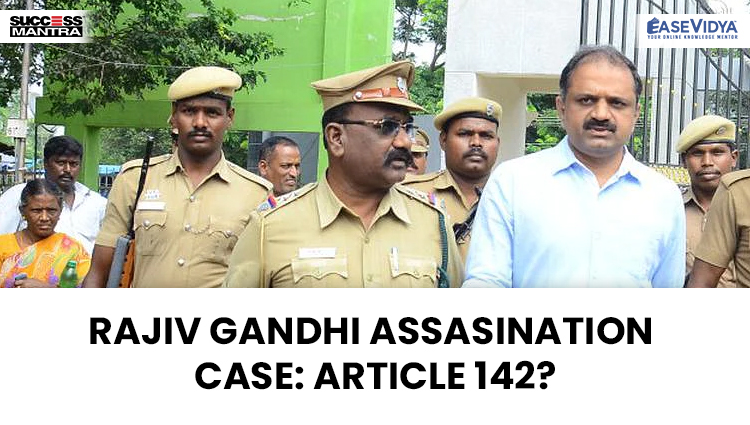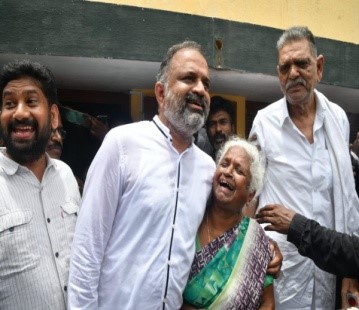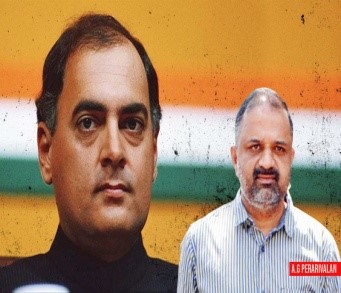
RAJIV GANDHI ASSASINATION CASE ARTICLE 142
RAJIV GANDHI ASSASINATION CASE: ARTICLE 142?
Recently, the Supreme Court has invoked its extraordinary powers to do complete justice under Article 142 of the Constitution and ordered the release of A.G. Perarivalan in former Prime Minister Rajiv Gandhi assassination case. The court protected federalism by holding that States had the power to aid and advice the Governor in case of pleas of pardon under Article 161 made by convicts in murder cases. Article 161 provides that the Governor of a State shall have the power to grant pardons, reprieves, respites or remissions of punishment or to suspend, remit or commute the sentence of any person convicted of any offence against any law relating to a matter to which the executive power of the State extends.

Current Affairs Notes By Success Mantra Coaching Institute GTB Nagar Delhi CLICK HERE
WHAT IS THE SUPREME COURT'S RULING?
Tamil Nadu Council of Ministers’ advice in 2018 to pardon Perarivalan was binding on the Governor under Article 161 (Governor’s power of clemency) of the Constitution. The Governor’s reluctance to take a call on the pardon plea has compelled the court to employ its constitutional powers under Article 142 to do justice to Perarivalan. The Supreme Court used Article 142 of the Constitution that grants it extraordinary powers to do complete justice, to release Perarivalan. The court dismissed the Centre’s argument that the President exclusively, and not the Governor, had the power to grant pardon in a case under Section 302 (murder) of the Indian Penal Code, saying this contention would render Article 161 a “dead-letter” and create an extraordinary situation whereby pardons granted by Governors in murder cases for the past 70 years would be rendered invalid.
WHAT IS ARTICLE 142?
Definition: Article 142 provides discretionary power to the Supreme Court as it states that the Supreme Court in the exercise of its jurisdiction may pass such decree or make such order as is necessary for doing complete justice in any cause or matter pending before it.
Constructive Application: In the early years of the evolution of Article 142, the general public and the lawyers both lauded the Supreme Court for its efforts to bring complete justice to various deprived sections of society or to protect the environment. The Cleansing of Taj Mahal and justice to many undertrials is a result of the invocation of this article only. In the Union Carbide case, relating to the victims of the Bhopal gas tragedy, the Supreme Court placed itself above the laws made by the Parliament or the legislatures of the States by saying that, to do complete justice, it could even override the laws made by Parliament. However, in the Supreme Court Bar Association v. Union of India, the Supreme Court stated that Article 142 could not be used to supplant the existing law, but only to supplement the law.
Cases of Judicial Overreach: In recent years, there have been several judgments of the Supreme Court wherein it has been foraying into areas which had long been forbidden to the judiciary by reason of the doctrine of ‘separation of powers’, which is part of the basic structure of the Constitution. One such example is: The ban on the sale of alcohol along national and state highways: While the notification by the central government prohibited liquor stores along National Highways only, the Supreme Court put in place a ban on a distance of 500 metres by invoking Article 142.
PARDONING POWERS OF THE PRESIDENT IN INDIA
- Under Article 72 of the Constitution, the President shall have the power to grant pardons, reprieves, respites or remissions of punishment or to suspend, remit or commute the sentence of any person convicted of any offence where the sentence is a sentence of death.
- Limitation: The President cannot exercise his power of pardon independent of the government. In several cases, the Supreme Court (SC) has ruled that the President has to act on the advice of the Council of Ministers while deciding mercy pleas. These include Maru Ram vs Union of India in 1980, and Dhananjoy Chatterjee vs State of West Bengal in 1994.
- Reconsideration: Although the President is bound by the Cabinet’s advice, Article74 (1) empowers him to return it for reconsideration once. If the Council of Ministers decides against any change, the President has no option but to accept it. Under Article 161, the Governor in India too has pardoning powers.

Difference Between Pardoning Powers of President and Governor: The scope of the pardoning power of the President under Article 72 is wider than the pardoning power of the Governor under Article 161 which differs in the following two ways:
- Court Martial: The power of the President to grant pardon extends in cases where the punishment or sentence is by a Court Martial but Article 161 does not provide any such power to the Governor.
- Death sentence: The President can grant pardon in all cases where the sentence given is the sentence of death but the pardoning power of the Governor does not extend to death sentence cases.
PRAVAHINI Current Affairs Notes By Success Mantra Coaching Institute GTB Nagar Delhi CLICK HERE
KEY TERMS
- Pardon: It removes both the sentence and the conviction and completely absolves the convict from all sentences, punishments and disqualifications.
- Commutation: It denotes the substitution of one form of punishment for a lighter form. For example, a death sentence may be commuted to rigorous imprisonment, which in turn may be commuted to a simple imprisonment.
- Remission: It implies reducing the period of sentence without changing its character. For example, a sentence of rigorous imprisonment for two years may be remitted to rigorous imprisonment for one year.
- Respite: It denotes awarding a lesser sentence in place of one originally awarded due to some special fact, such as the physical disability of a convict or the pregnancy of a woman offender.
- Reprieve: It implies a stay of the execution of a sentence (especially that of death) for a temporary period. Its purpose is to enable the convict to have time to seek pardon or commutation from the President.

TEST YOURSELF
Q.1 Recently, under which of the following Articles of the Indian Constitution the Supreme Court has invoked its extraordinary powers to do complete justice and ordered the release of A.G. Perarivalan in former Prime Minister Rajiv Gandhi assassination case?
- Article 32
- Article 71
- Article 142
- Article 161
Q.2 Article 142 provides discretionary power to the ________ as it states that the _________ in the exercise of its jurisdiction may pass such decree or make such order as is necessary for doing complete justice in any cause or matter pending before it.
- Supreme Court
- High Courts
- Both Supreme Court & High Court
- None of the above-mentioned
Q.3 In which of the following landmark judgements, the Supreme Court (SC) has ruled that the President has to act on the advice of the Council of Ministers while deciding mercy pleas?
- Maru Ram v. Union of India
- Dhananjoy Chatterjee v.State of West Bengal
- AK Gopalan v. State of Madras
- None of the above-mentioned
Q.4 Which of the following articles of the constitution says that the Governor of a State shall have the power to grant pardons, reprieves, respites or remissions of punishment or to suspend, remit or commute the sentence of any person?
- Article 161
- Article 72
- Article 78
- None of the above-mentioned
Q.5 There are different terms used to explain the Pardoning powers of the President/Governor. Which of the following is not one of them?
- Commutation
- Revision: ANSWER
- Remission
- Pardon












0 Comment